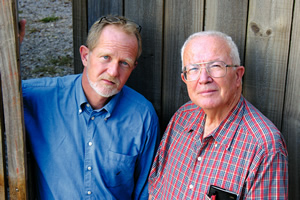Bill Brockton, the fictional incarnation of Bill Bass, world-famous founder of University of Tennessee’s Body Farm, travels to France for his latest adventure in the science of forensic anthropology. In The Inquisitor’s Key, the seventh mystery in the Body Farm series, Jon Jefferson and Bill Bass, the writing team known as Jefferson Bass, have put Brockton in the uncomfortable position of having to identify centuries-old bones that may be not only historically significant but religiously important as well. And if any combination of pursuits can prove deadly, it’s surely science and religion.
Bill Bass and the UT Body Farm are now as much a part of Tennessee as Rocky Top. The fact that a small patch of ground in Knoxville is used to study the decomposition of the human body is a morbid source of pride for any crime aficionado between the Mississippi River and the Great Smokey Mountains, and the research that goes on behind the locked gates is internationally renowned. Bass’s post-mortem detective work has helped solve dozens of real-life disappearances and murders, both a tribute to the power of science and an inspiration for artists ranging from Patricia Cornwell to writers for CSI and Bones. Through six earlier Body Farm novels, Bass’s alter-ego, the fictional Brockton, has applied his science to a variety of mysteries set predominantly in Tennessee.
 Now, Brockton takes his bone-reading ability to Europe. Specifically Avignon, France, where the popes of the Middle Ages built a great cathedral and an even greater palace from which to rule over Christendom. The fourteenth century was a time for the popes to expand their wealth and crush religious opposition. But it was also a time of art patronage, when painters and sculptors from around Europe ventured into southern France in search of papal largesse. As Brockton observes, “The modern theater festival [of Avignon] surely paled in comparison to the real-life pageants and power plays enacted here centuries earlier by popes and peasants, kings and cardinals, painters and poets.” And, of course, there was at least one mysterious death.
Now, Brockton takes his bone-reading ability to Europe. Specifically Avignon, France, where the popes of the Middle Ages built a great cathedral and an even greater palace from which to rule over Christendom. The fourteenth century was a time for the popes to expand their wealth and crush religious opposition. But it was also a time of art patronage, when painters and sculptors from around Europe ventured into southern France in search of papal largesse. As Brockton observes, “The modern theater festival [of Avignon] surely paled in comparison to the real-life pageants and power plays enacted here centuries earlier by popes and peasants, kings and cardinals, painters and poets.” And, of course, there was at least one mysterious death.
Brockton is called to Avignon by his assistant, Miranda, who has been working an archaeological site in the former Palace of the Popes. Ancient human remains have been uncovered, and Brockton is needed to investigate. Soon, amid discussions of radiocarbon dating, CT scans, and facial reconstruction, sinister deeds are done. Unknown people lurk in the shadows of cobbled streets. The police, in the form of Inspector Descartes, are called in when an archaeologist is murdered in spectacular fashion. Driven by these events, Brockton and Miranda, sexual tension running high, must race to investigate Jesus of Nazareth, the Shroud of Turin, religious art, and the figurative and literal skeletons buried in the history of the Catholic Church. “You would make a good detective, Docteur,” Descartes notes of Brockton. But what will Brockton detect? And will it cause a religious calamity?
 The Inquisitor’s Key is a departure from form for Jefferson Bass. In addition to being the first book in the series set in another country—and the first not to include the word “bone” anywhere in the title—the story incorporates historical flashbacks to the 1300s, that distant time when artists served at the whim of their patrons, and religion dictated life’s every turn. These passages provide a counterpoint to the technology-filled world inhabited by Brockton and demonstrate that as much as things have changed in the last seven hundred years, human passions remain a constant source of good and evil. The book is also as much a travelogue as a mystery novel. Bass is clearly smitten with Avignon, the old city on the Rhone River, “ringed by an ancient wall and crowned by tiled rooftops and massive stone towers, all glowing in the golden light of Provence.” In this story, location has been elevated to a character in a way quite unlike the treatment of Brockton’s native East Tennessee in earlier installments.
The Inquisitor’s Key is a departure from form for Jefferson Bass. In addition to being the first book in the series set in another country—and the first not to include the word “bone” anywhere in the title—the story incorporates historical flashbacks to the 1300s, that distant time when artists served at the whim of their patrons, and religion dictated life’s every turn. These passages provide a counterpoint to the technology-filled world inhabited by Brockton and demonstrate that as much as things have changed in the last seven hundred years, human passions remain a constant source of good and evil. The book is also as much a travelogue as a mystery novel. Bass is clearly smitten with Avignon, the old city on the Rhone River, “ringed by an ancient wall and crowned by tiled rooftops and massive stone towers, all glowing in the golden light of Provence.” In this story, location has been elevated to a character in a way quite unlike the treatment of Brockton’s native East Tennessee in earlier installments.
The success of the Body Farm novels is due mostly to fans who appreciate scientific accuracy in their mysteries, who enjoy the company of the affable Brockton, and who aren’t squeamish when it comes to discussions of the ways nature has of separating dead flesh from bone. In these regards, The Inquisitor’s Key will not disappoint. Whether Brockton, having now seen France, can return to his old Appalachian haunts is another mystery altogether.
Bill Bass and Jon Jefferson will be promoting The Inquisitor’s Key at the following Tennessee venues: May 12 at Parnassus Books in Nashville; May 13 at Kroger in Farragut; May 13 at Books-A-Million in Knoxville; May 14 at Hastings Books in Maryville; and May 19 at Sam’s Wholesale Club in Knoxville. Click here for details.
Tagged: Fiction





